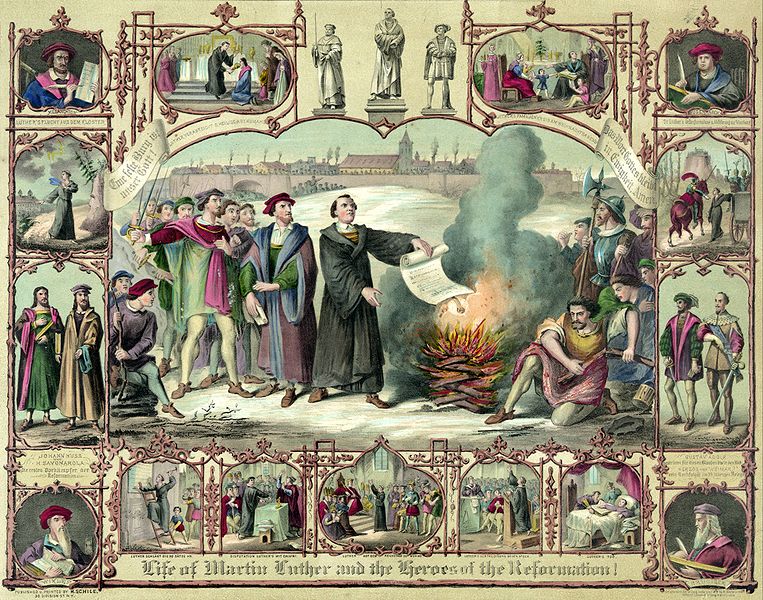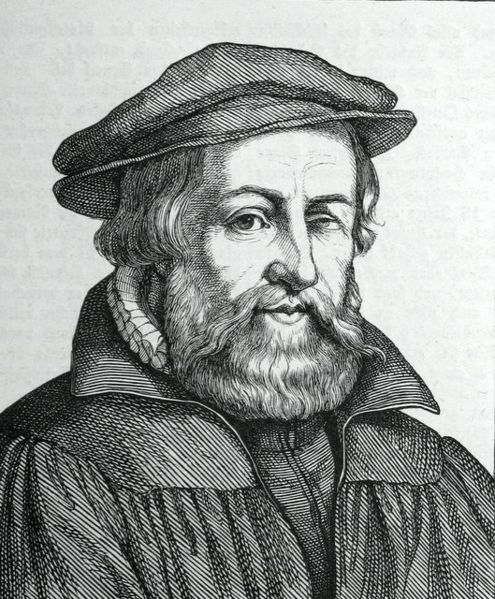Reforming History
The Impact of the Reformation of the Broader Profession of History
This chapter aims to highlight the key themes and people of the reformation, as well as show how these themes and the profession of history itself differs from previous eras and impacts the subsequent. An appropriate place to start any story is to begin with the origins and agendas, move onto the actual period and finally end with how history was regarded along with the duality of history in the Reformation.
Origins and Agendas in the Reformation and Their Impact
The period from 1515 to 1525 was perhaps one of the most innovative times in European history, as well as one of the most controversial (p89, Grant). This was an era of momentous impact on the Western world, religiously, politically, and historically: the Reformation began to take hold during this time and shift the focus of the population (pg1, Spitz). The origins during the reformation differ greatly from earlier eras in that there was a distinct departure from Roman roots as the source of legitimization, and the “barbarian” cultures began to look inward to their own traditions in an attempt to establish identity, meaning, and a place in history. Perhaps this departure marks a “progression of empires”–empires that are constantly changing throughout history but at the same time building upon previous era’s traditions and ideals.

This departure or progression highlights the importance of agenda to historiography in the Reformation. In the early 16th century and before, citizens exclusively accepted the teachings of the Catholic Church (p255, Wiesner-Hanks). However as the Reformation began, many reformers observed the teachings and practices of the Church and began preaching against the greed and corruption they witnessed. Separating from previous eras, the agenda of many historians during the Reformation began to separate into two-parts. There was the Catholic Church and other religious institutions, which still remained very powerful. Pushing up against the Catholic Church was a strong movement towards a more secular agenda. This duality of the spiritual and the secular caused two distinct narratives to dominate the Reformation. These two narratives, while not altogether groundbreaking, were a new way for history to be approached as a profession. These narratives were also caused, in part, by a polemical view of “tradition” and in many ways—by extension—the church; there was a general separation from the Roman Catholic Church during this period and the emergence of the new Protestant segment headed in large part by Martin Luther (1483-1546), a 16th Century theologian and professor of theology at Wittenberg University in Germany (the university has since been renamed in honor of Martin Luther), who challenged the authority of the Pope and Roman Catholic Church (p255 Wiesner-Hanks). Luther, born into a middle class peasant family, received his education, in part, at the University of Erfurt, where he studied law at a university renowned “for its humanism, and various religious tendencies fermented there,” (p98, Grant). Luther’s reformation was, in part, hastened by the selling of indulgences (clemency of sins) by powerful Popes, such as Leo X (p65/67, Spitz). One of Luther’s greatest and most impactful contributions was his undertaking of making the bible more accessible to the people by translating it from Latin to vernacular, in part helped by the advent of the printing press. These translations, translated not from Hebrew or Greek, were translated from a late fourth-century Latin version of the Bible known as The Vulgate into fourteen translations (p96, Grant). Luther’s view of history was highly spiritual - he believed that the Bible was the only true source of salvation, a direct contradiction to the powerful Roman Catholic Church, which sought authority and legitimacy from the Bible. This religious schism caused divisive shockwaves throughout Germany and the world at large; the region of Germany splintered along religious lines and the world as a whole experienced the effects of this religious reformation (p179, Grant). Religion, politics, and history had traditionally been closely interconnected and Luther also marked an important change from a focus on the past and its traditions to new attention being paid to the idea of modernity, impacting the course of history. (p256/260, Wiesner-Hanks). Luther, opening the possibilities of other legitimized religions created an atmosphere of tolerance, which in turn opened up the possibilities for growth and innovation in the fields of science, philosophy, technology and history (p264, Wiesner-Hanks). 
</figure> Martin Luther, along with others such as Johann Sleidan, represented a changing of the tides in historiographical terms. Johann Sleidan was a 16th century Humanist with a law degree, hired as the official historiographer of Germany. Sleidan, leaning on his legal background, adhered to the practice of valuing first–hand witness accounts–a practice first established by Thucydides. Sleidan looked to these accounts in an attempt to vicariously experience the past (p167 Kelley). Sleidan was so staunchly attached to evidence that he famously said, “I would rather die than say, still less write, anything without proof”(p169, Kelley). This was not necessarily new - - perhaps the zealous adherence was - - but marked a change in the way professional historians approached their practice.
Duality in the Reformation
Throughout the Reformation, history was looked at through a critical lens and occupied a polemical role (p163, Kelley). While insistently critical, historians–as a profession–were regarded with much higher esteem than previous eras. Often this higher regard was used in attempts to link history to various agendas - Protestants attempted to link their own traditions to that of older traditions. This distinct duality present during the Reformation, and distinct from earlier eras, allowed for two completely separate narratives to emerge (p163, Kelley). Coupled with this duality, there was a complete collapse of the religiously centered national identity and further emphasis placed on national narratives to build the identity of the people.
The idea of “Confessional History” emerges out of the Reformation and, “in many ways pluralized, politicized, and polemicized, subverting the master narrative of Christian universal history.” (p169, Kelley) Hastened by the controversies initiated by Martin Luther, a large scale, deep investigation into the sources used by medieval and early Christian historians began. The views of history during the Reformation, and even the Counter-Reformation, are formulated through a combination of chronological and geographical frameworks along with the ideals of a universal history codified from the medieval chronicles (p170, Kelley). The Protestant theologians saw this “confessional history” through a moral rather than political lens. Protestants also faced the problem of plotting a meaningful tradition and constructing a communal history in a new way. This was approached in two ways, the first of which was the Melanchthon method, which sought a doctrinal continuity by tracing a spiritual tradition based on “pure religion” back to the early fathers of history. Competing with this method, started by 16th century humanist and Lutheran, Flacius Illyricus, was the belief that legitimization and credibility came from the idea that there was a continuous holy succession of the Christian doctrine, which preserved the true Christian faith. Illyricus complied hundreds of names of the precursors of the Lutheran faith in this effort to prove a rich historical tradition (p171, Kelley). This idea of history providing a cornerstone for legitimization and confessional correctness became pivotal during the many religious controversies that took place during the Reformation (p172, Kelley).
The idea of universal history codified as a distinct narrative during the Reformation allowed a broadening of accessibility to said history. The idea of universal history, during the Protestant Reformation, is one marked by an incredible revisionist effort to rewrite history in such a way that it “would convict the Roman hierarchy and justify the ‘true religion’, which Luther and his colleagues were preaching.” (p167, Kelley). Often national historiographers generated or invented “traditions to suit modern needs and hopes,” as well as to serve as a source of credibility (p168, Kelley). As a result, most nations developed their own “versions” of a universal history uniquely suited to the context of their country; while these histories and traditions varied slightly in content, they were uniform in their goal of providing credibility, sense of individualism, as well as establishing a place in the history of the world.
Alongside confessional and universal histories, another history that had emerged in earlier eras but really began to take foot in the Reformation was humanism. In the process, humanism placed a further focus on looking at individual histories and the importance of humans in and on history. This was a time for immense growth in both the field of historiography, and in the potential for history to become a respected science rather than mere art, “yet the rhetoric of historical impartiality, disinterested curiosity, and scientific aspirations remained; and even the most committed historians contributed, if only inadvertently, to the project of historical inquiry–to tell the truth, be humanly useful, and perhaps even be a way to wisdom. ”Clinging to these ideals–and at the same time vastly increasing the quantity, accessibility, and critical understanding of source materials–history reinforced its potential to become a true science.” (p187, Kelley)
Works Cited
Grant, A. J. A History of Europe from 1494 to 1610. New York: n.p., 1951. Print.
Spitz, Lewis William. The Protestant Reformation, 1517-1559. New York: Harper & Row, 1985. Print.
Wiesner, Merry E. A Concise History of the World. New York: Cambridge UP, 2015. Print.